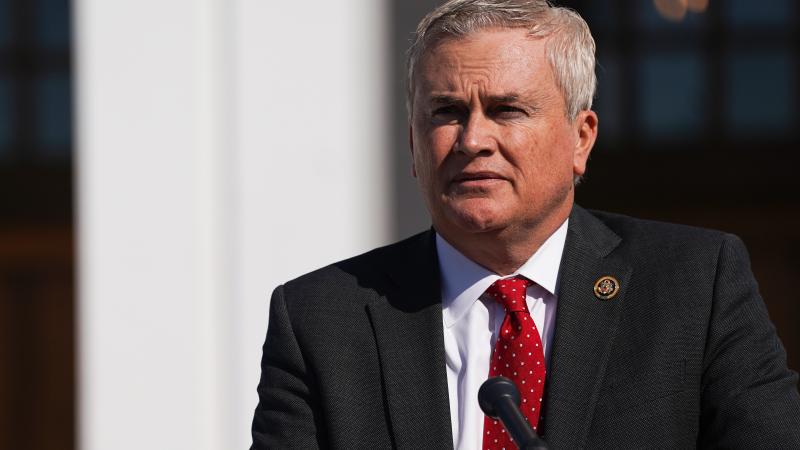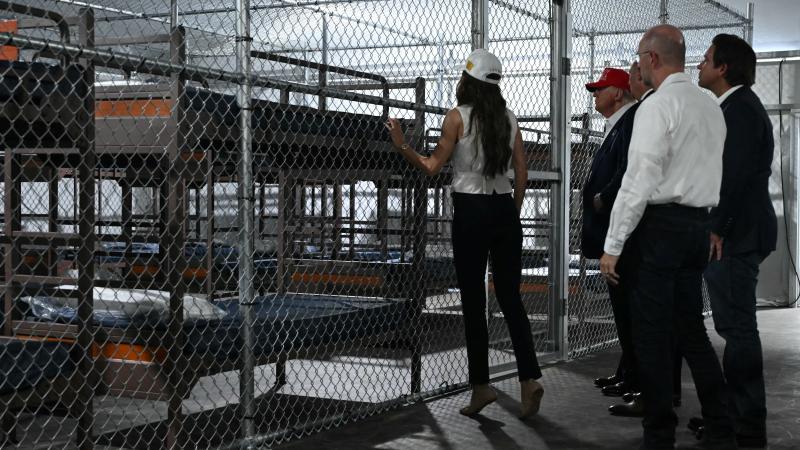Biden pledges western support amid fears of Russian breakthrough in Ukraine
“We’re not backing down. In fact, we’re standing together against this illegal aggression,” Biden insisted.
President Joe Biden and Ukrainian President Voloydymyr Zelenskyy this week signed a 10-year bilateral security agreement amid the ongoing Russian invasion. But despite renewed promises of backing, the Ukrainian forces appear to be giving ground to Kremlin troops across the front lines and could face substantial losses in the event of a coordinated offensive.
Speaking at a press conference in Fasano, Italy, Biden indicated that the security pact’s “goal is to strengthen Ukraine’s credible defense and deterrence capabilities for the long term.”
While Biden explicitly ruled out the prospect of sending American troops to fight in Ukraine against the invading Russian forces, he highlighted that the agreement would include the provision of arms, training programs for Ukrainian forces, intelligence sharing, and other logistical support operations.
He made the remarks amid the G7 summit in which member nations also agreed to unfreeze $50 billion in frozen Russian assets to fund Ukraine’s defense. Roughly $280 billion in Russian Central Bank funds have been frozen as part of international sanctions.
The unfreezing will mark the latest substantive financial aid to Kyiv after the Biden administration in late April approved roughly $61 billion in support as part of a broader foreign aid package.
“We’re not backing down. In fact, we’re standing together against this illegal aggression,” Biden insisted.
Biden’s statement comes amid widespread expectations of a large-scale Russian offensive this summer and in the wake of a Russian operation in the Kharkiv region that has seen its forces take a number of border villages.
Russian gains this year
In February of 2024, the Russian Army seized control of the city of Avdiivka, a satellite city to the north of Donetsk situated along the 2014 ceasefire line that divided the Ukrainian territory from that of pro-Russian separatists.
The city had served as a key fortification amid the invasion and managed to hold out for just under two years against the Russian assault. Its fall, however, has rendered Toretsk as the last fortress city along the ceasefire line and exposed limited Ukrainian defenses to the north and west of Avdiivka.
Russian forces have since managed to advance in those directions, moving the line a considerable distance from the former Ukrainian forces and carving out a position from Novooleksandrivka to the North to Netailove to the South.
The Russians have also managed to recapture the towns of Robotnye, Staromaiorske, and Klischchiivka, three of the only settlements the Ukrainians managed to retake in the ill-fated 2023 counteroffensive.
More recently, Russian forces returned to the Kharkiv region, taking a handful of outlying villages and the northern portion of the city of Vovchansk. The area was previously occupied by the Russians in the early stages of the war, but lost in the September 2022 counteroffensive that pushed the Russians further east.
Putin’s ultimatum
Earlier this week, Russian President Vladimir Putin offered terms of a peace proposal in which Ukraine would cede the Donetsk, Luhansk, Zaporizhzhia, and Kherson Oblasts, none of which Russia fully controls. Oblasts are generally defined as an administrative division or region.
The four regions held internationally condemned referendums in late 2022 to join the Russian Federation and Moscow regards them as part of its own territory. Putin further demanded the lifting of western sanctions and permanent neutrality of Ukraine.
"As soon as Kyiv agrees to these conditions, agrees to completely withdraw its troops from the DPR, LPR, Zaporozhye and Kherson regions and actually launches this process, we are ready to start negotiations without delay,” state media outlet Tass quoted Putin as saying.
“I repeat, our principled position is as follows: the neutral, non-aligned, non-nuclear status of Ukraine, its demilitarization and denazification,” he insisted. “What’s more, these parameters were generally agreed upon by everyone back during the Istanbul talks in 2022.”
Kyiv promptly dismissed the proposal, with Zelenskyy aide Andriy Yermak saying “[t]here will be no compromise on independence or territorial integrity… Ultimatums don't work with Ukraine, and our people proved that on the battlefield in the past two years.”
Lost opportunities and consequences
Speaking Tuesday on the John Solomon Reports podcast, former Trump Deputy National Security Advisor Victoria Coates suggested that the Biden administration had missed the chance earlier in the war to capitalize on Russian errors and that Washington had squandered many of the resources Congress allocated to aid Kyiv.
“He certainly hasn't taken advantage of what should have been significant, significant advantages for Ukraine really, for two years ago when they had the momentum,” she said of Biden. “And you have had extraordinary generosity out of the United States, some generosity out of Europe, but none of it was done in a strategic, targeted manner to actually win the war.”
“And what we're seeing out of Putin now are provocative actions, he is sailing warships into the Caribbean,” she continued, referencing the recent deployment of a Russian frigate and nuclear submarine to Cuba for military drills.
“He is visiting today, North Korea, for the first time in something like 15 years to visit with Kim Jong Un on undoubtedly, to place a weapons order,” she went on. “So he thinks he can act with impunity right now. And that's a dangerous thing for the Biden administration.”
Security pact and peace summit
The 10-year security pact that Biden announced largely focused on logistical support such as the provision of weapons and equipment; intelligence, and the integration of Ukraine with the rest of Europe, all of which the U.S. has supported amid the war already.
“The agreement that President Zelenskyy and I just signed also lays out our shared vision for a just peace, a peace rooted in the U.N. Charter and the principles of sovereignty and territorial integrity, a peace with a broad base of support around the world that holds Russia accountable for the damage it has done in this war,” Biden said.
Also this week just under 80 nations affirmed their support for Ukraine’s territorial integrity at a peace summit in Switzerland that notably did not include a Russian delegation or Chinese officials.
The conference’s final statement affirmed that “respect for territorial integrity and sovereignty … can and will serve as a basis for achieving a comprehensive, just and lasting peace in Ukraine,” according to the Associated Press. Such a condition would almost certainly run afoul of the Russian position and prove a sticking point in any possible negotiations.
Fears of a breakthrough
Though the Russians managed to take a modest slice of land in the Kharkiv region in May, that effort has not resulted in the seizure of a large swath of territory or the oblast’s eponymous megacity.
Zelenskyy that month, however, warned that the Russian incursion was possibly only the “first wave,” according to Al Jazeera, further admitting to the AFP that “we have about 25 percent of what we need to defend Ukraine. I’m talking about air [defense].”
The Pentagon, last week, however, indicated that it does not expect the Kharkiv operation to translate to a substantive breakthrough.
"A couple of weeks ago, there was concern that would see a significant breakthrough on the part of the Russians… I don't think we'll see that going forward. I don't see a large exploitation force that could take advantage of a breakthrough,” Secretary of Defense Lloyd Austin said, according to CBS.
Ben Whedon is an editor and reporter for Just the News. Follow him on X.
The Facts Inside Our Reporter's Notebook
Links
- 10-year bilateral security agreement
- press conference
- approved roughly $61 billion
- operation in the Kharkiv
- Russian Army seized control of the city of Avdiivka
- Donetsk, Luhansk, Zaporizhzhia, and Kherson Oblasts
- Tass quoted Putin as saying
- Andriy Yermak
- Russian frigate and nuclear submarine to Cuba
- Associated Press
- warned that the Russian incursion
- CBS reported
- Follow him on X















